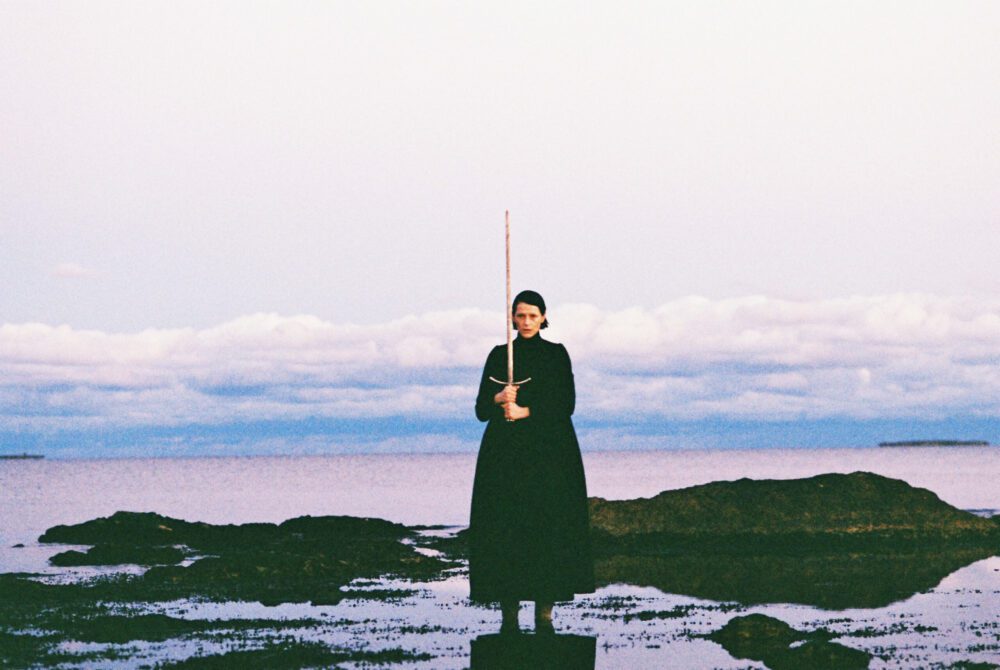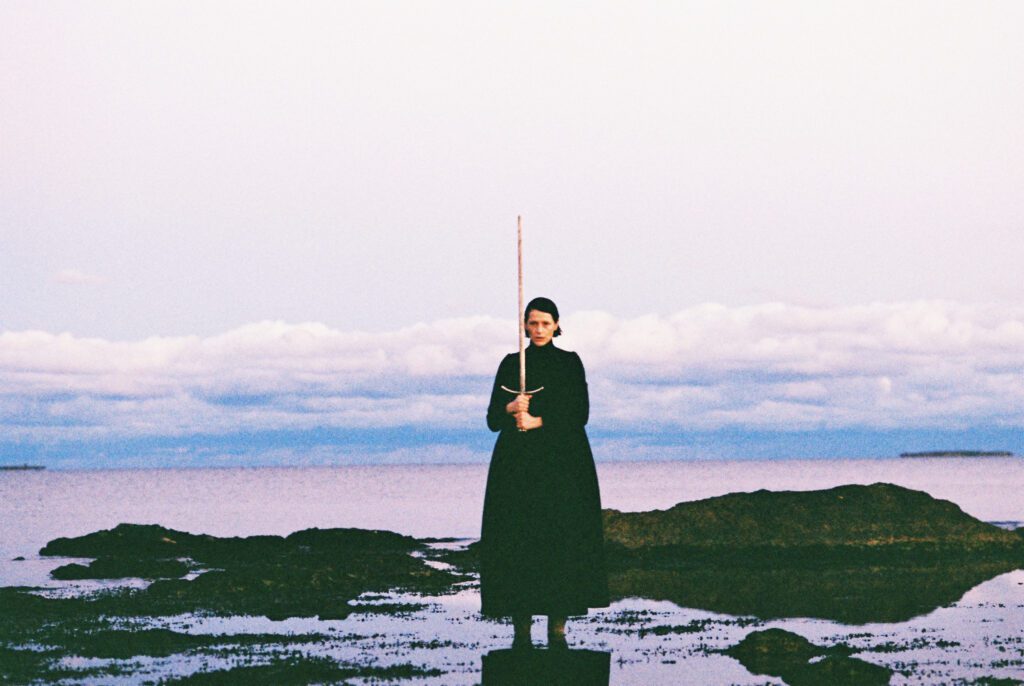El Perro del Mar Reclaims Artistic Dignity with FREE LAND EP


In the late 2000s, Stockholm-born contemporary artist Klara Lidén began work on her Poster Paintings series; collecting colorful adverts discarded in the streets of Berlin, she glued layers of them together until they were inches thick, then pasted a plain white sheet over everything, obliterating any information underneath with her own blank slate. You can see her work on the cover of the latest El Perro del Mar EP, FREE LAND, out today; the band’s sole member, Sarah Assbring, wrote many of the songs situated beneath one of Lidén’s poster works, after the Moderna Museet in Stockholm invited her to create an album inspired by its collection. Assbring was free to roam the museum when it was closed to the public, with the expectation that she would perform works composed there by the year’s end. As the pandemic set in, plans for the performance were scrapped, but Assbring’s access to the collection became even more exclusive; as she posted up in front of Lidén’s poster series, she pondered the suspension of time, construction and deconstruction, resistance, creative freedom, and the artist’s role in a world saturated by corporate interests.
“Her work was key to when I really figured out what the album was gonna be like and what it was gonna be about. I placed myself and my instruments I sat there working and writing, and the idea kind of grew on me – retaking the dignity and the power and the meaning and the value of culture and art in society,” Assbring explains.
“With the risk of sounding pretentious, I always need to react against myself. I’ve done that with every record and that’s the reason why I sound the way I do on every different album – it’s always the fruit of a reaction towards myself, always trying to avoid becoming tired of myself,” she adds. “This album is very much a part of that. There is a kind of cheekiness in some of the songs, a couldn’t care less kind of attitude to it, I draw from Klara in that kind of clean slate way. In a way, it’s kind of like, the [middle] finger gesture towards myself.”
Sonically, FREE LAND hinges on ambient textures, but rather than floating though an endless expanse, these sounds feel contained and amplified by smooth, empty surfaces. It’s fuzzy with the white noise of a long gallery hallway; rawly reconstructed from broken pieces, but seamed together again with golden lacquer, like Kintsugi pottery. Five tracks are bookended by “Enter” and “EXIT” – Assbring invites listeners to inhabit this space with her, walk through its rooms, observe the artifacts she’s collaged together.
And yet, it’s not inaccessible; instead, the EP is purposefully imbued with the punky, DIY spirit of an artist, as she says, reacting against herself – burying her voice in distortions, delicately excavating an unnamed anger, and rejecting the idea of songs as commodified metrics. The EP itself is its own rare kind of art-piece, like the ones in the museum that inspired it; the physical release is limited to 300 hand-numbered copies, and only one single (“Dreamers change the world”) is available on streaming platforms beyond Bandcamp.
“I really wanted it to have that kind of feeling I feel about old records that I have, that I’m one of the few who owns this album. But it’s also a statement that has to do with how we value artists today,” explains Assbring. “It has a lot to do with my feelings about streaming services, such as Spotify, and the way that they pay musicians. Streaming services kill your dignity as an artist, and I’m not okay with that. It was a stand to take, a minimal way to voice that feeling and make people aware of that, to direct listeners to Bandcamp instead, where I actually feel like you have your dignity restored as a musician.” She rails against the notion that musicians should produce content every six months to a year to stay relevant: “I try to be as productive as a possibly can but it still has to consist of something, it still needs a soul,” she says. “And soul takes time, music takes time, and it needs to take time sometimes.”
Assbring confronts that most clearly on “Dreamers,” making it a poignant pick for a more traditional single release (“The Bells,” another recently released single, is a stand-alone project and does not appear on the EP). Timid piano and minimal strings swoop through sentiments that re-center the true value of art – not “triumphs,” “likes,” and “numbers,” but slow, thoughtful creation that adds beauty and meaning to those who take the time to revel in it. As she repeats the titular line, you can almost imagine her standing in the abandoned museum, its paintings come to life to sing along. A powerful video for the track, directed by longtime visual collaborator Nicole Walker, sees Assbring as the patron saint of the arts, wearing Balenciaga and wielding a sword with a fearsome feminine strength.
The image is in direct opposition to the sad, doe-eyed Swede making stripped-down pop, a characterization that’s dogged her since she released her self-titled debut in 2006 despite her moves over the ensuing fifteen years toward more experimental sounds. That album, she says, came out of a place of utter despair – it opens with the sarcastic suggestion that buying candy could be an antidote to her hopelessness – but making it propelled her into indie notoriety. “When I made my first album I was completely put in that bracket where I was that sad person, and it’s true, I was. I had been for a really long time,” she admits. “But career wise, I would not be here if I had stayed in that [frame of mind]. It would have been actual suicide to want to be back there, musically, and as a person. As I move further musically, I also have to move further as a person. And I have, and I’ve come to understand a lot of things in my life as I have grown older and that is a really wonderful thing.” On FREE LAND, she sums up that trajectory with “Life is full of rewards,” its mantras delivered in a tired-sounding deadpan, but sincere nonetheless.
“That song definitely goes right back into the core of my musicianship, from the absolute beginning of the debut album,” Assbring says. When she started writing FREE LAND, the difficulty of 2020 had put her in the same desperate state of mind. “I wanted to say, life is full of holes [but thought] I can’t sing that. It isn’t! Isn’t it really full of rewards? It’s kind of like you’re sitting in front of your lame therapist, waiting for them to turn you around,” she says. “It’s really a way for me to communicate with myself, trying to turn myself around. It’s a really nice way of writing, because it goes extremely quick and it’s really just a tapping into the way the mind works sometimes, the things that the mind tells you.”
Also therapeutic, she says, was finally collaborating with Devonté Hynes, better known as Blood Orange, on “Alone in the halls,” a ghostly take on Black Sabbath’s “Changes.” She gravitated toward Charles Bradley’s version of the classic, not realizing that it was written by Ozzy Osbourne. “From the beginning of this year, I’ve listened so much to that song, and felt like, this is exactly what 2020 feels like,” she says. “It was also what it felt like walking around in the museum, so I decided that I wanted to make a choral kind of work with it, like a very ambient feeling of just wandering and wandering through changes.” The two worked long-distance, their vocals melding to haunting effect.
But by and large, Assbring’s most essential collaborator was her partner, Jacob Haage. They’ve just relocated to a Medieval town on an island not far from Stockholm, as the pandemic made them question the sustainability of city life. But in a country that famously limited locking down even during the height of the first wave, Assbring says not much changed about the process of completing the record; she was still able to go to her studio, and working from home was made easier with a live-in co-producer. More than anything in her life – even buying herself candy – creating music has been the glue that’s held her together.
“For me it’s a way of surviving, to change, just move along with the wind or what’s happening in my life. The different intake gives different outputs,” she says. “I may be an insecure person, and unstable person, at times, [but] when it comes to my artistic and creative side, I feel so sure of what I’m doing and I never doubt it and I never question it. And I always know what I’m doing and where I’m heading.”
FREE LAND closes with a meditation, one of two audio snippets on the record (the other opens its title track; Assbring remains tight-lipped about their sources). “If you feel safe in the area you’re working in, you’re not working in the right area. Always go a little further into the water than you feel you’re capable of being in, and when you don’t feel that your feet are quite touching the bottom, you’re just about in the right place to do something exciting,” intones a genderless voice. El Perro del Mar broaches very exciting territory on FREE LAND, an island of thought separate from mainland music’s industry standards, a world of her own creation. “Waited all my life for this,” she moans over droning brass on the churning title track, staking her claim to a wild new frontier populated by dreamers and artists willing to paste over everything that came before.
Follow El Perro del Mar on Facebook for ongoing updates.

